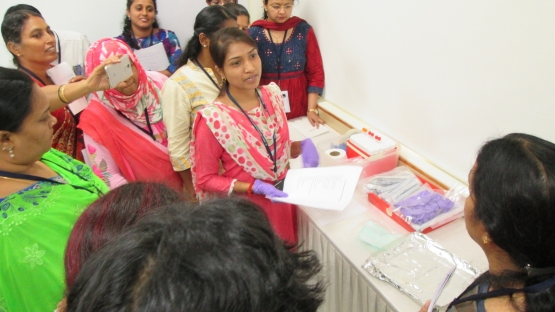Researchers, professors and PhD students from universities and institutes all over India, Sri Lanka, Bangladesh and Indonesia gathered at a two-day workshop on 12-13 June to discuss the role of stable isotope techniques in nutrition in informing nutrition policies and programmes. Participants were given the opportunity to learn about the application of stable isotopes to assess body composition, breastfeeding patterns, energy expenditure, iron bioavailability, and vitamin A status.
Theoretical considerations on the principles and application of stable isotope techniques were broken up into practical demonstrations from dosing and sampling to hands-on sessions on data processing and evaluation. This enabled participants to gain insight and understanding on how to use stable isotopes in their nutrition-related research.
Ranadip Chowdhury, scientist at the Centre for Health Research and Development, Society for Applied Studies in New Delhi, India, summarized what many participants voiced: “It was great to be part of a workshop that teaches how to measure public health outcomes using stable isotope techniques. Our group feels more confident now to design studies to answer relevant questions on where the isotopes will be useful to measure body composition or infant breast milk intake accurately.” Dimas Erlangga Luftimas, lecturer and researcher at the Universitas Padjadjaran in Indonesia, further emphasized the usefulness of the training: “I really hope this is the start of future collaboration with new colleagues to enhance education, empower the community and benefit society.”
The organization of the workshop was part of the Collaborating Centre’s outreach and capacity building activities, which was enabled by partial funding from the Indian Council of Medical Research. Professor Kurpad expressed his appreciation of St. John’s Research Institute being a Collaborating Centre of the IAEA: “This greatly facilitates our ability to attract additional funding for activities such as this training workshop.”
St. John's Research Institute in Bangalore was designated as the first IAEA Collaborating Centre for Nutrition in 2010. The designation was renewed in November 2015 for another four years. With a focus on nutrition as well as on infectious and lifestyle-related diseases, the Institute uses stable isotope techniques for nutrition-related research and programme evaluation.



